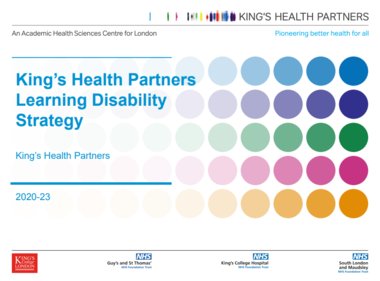15 June 2020
To mark Learning Disability Awareness Week, our Mind & Body team have launched their first Learning Disability Strategy to help bridge the 16-year mortality gap between those with a learning disability and those without.
More than 1.2 million people in England have a learning disability and face significant health inequalities compared to others. On average, adults with a learning disability die 16 years earlier than the general population – 13 years for men, 20 years for women. This week, as the NHS marks Learning Disability Awareness Week, these stark statistics show the continued urgency to address the needs of people living with learning disabilities to bridge that gap.
The King’s Health Partners Learning Disability Strategy sets out its vision to help those with a learning disability get better health outcomes and have a better experience of care whether it’s in hospital or in the community. Some of the key challenges it highlights to making improvements include:
- the learning disability workforce is declining locally and there are shortages in specialist roles where there is less uptake of trainees
- a lack of understanding and confidence about learning disabilities in our workforce
- the difficulty in engaging meaningfully with our patients with learning disabilities across the system in order to inform service development
- difficulty securing funding to deliver sustainable services and ensure that we focus on local initiatives that support national priorities
- IT systems across our partnership with primary care do not always allow for sharing patient data which means that people with learning disabilities and their carers often have to tell their story multiple times
- a lack of awareness in secondary care of the outcome of Annual Health Checks and early identifiers.
The fact that some of these challenges look at supporting and aligning training, primary, secondary and community care demonstrates the unique value that King’s Health Partners can add. It’s strategy will be able to focus on collaboration across our four partner organisations so that every person helping someone with a learning disability in every setting is able to access the same training, support and resource.
We have greater access into research at King’s College London’s Institute of Psychiatry, Psychology and Neurosciences; the ability to focus on innovation and new models of care; expertise around co-design and co-delivery of education and training for health and social care staff together with service users and families.
Our five key priority areas in bridging the gap are:
- Person-centred care and user involvement: making information more accessible and raising the profile of learning disabilities services
- Consistency of pathways: improving communication and handover between primary and secondary care
- Workforce: improving our retention schemes across the partnership
- Having a single learning disability dataset: working with sustainability transformation partnership data, including social care
- Quality improvement and research to improve frontline care.
Joseph Casey, Deputy Director, Programme Delivery, King’s Health Partners, involved in drafting the new Learning Disability Strategy, said:
At a time when health inequalities have again been thrown into sharp relief, it is critically important that we realise the commitments in this strategy to people with learning disabilities. The strategy provides a focus and framework for how together we can improve outcomes that matter to people with learning disabilities and those close to them, improve their experience of the health and care system, including by developing career pathways for professionals working across boundaries.
This strategy has been developed by many people coming together – including people with learning disabilities, their families, carers and healthcare professionals – and I look forward to working with everyone to deliver the strategy.
Read the King’s Health Partners Learning Disability Strategy.
We are committed to joining up mental and physical healthcare, training and research to improve health outcomes for our patients and service users. Find out more about the important work we are doing in holistic care.





